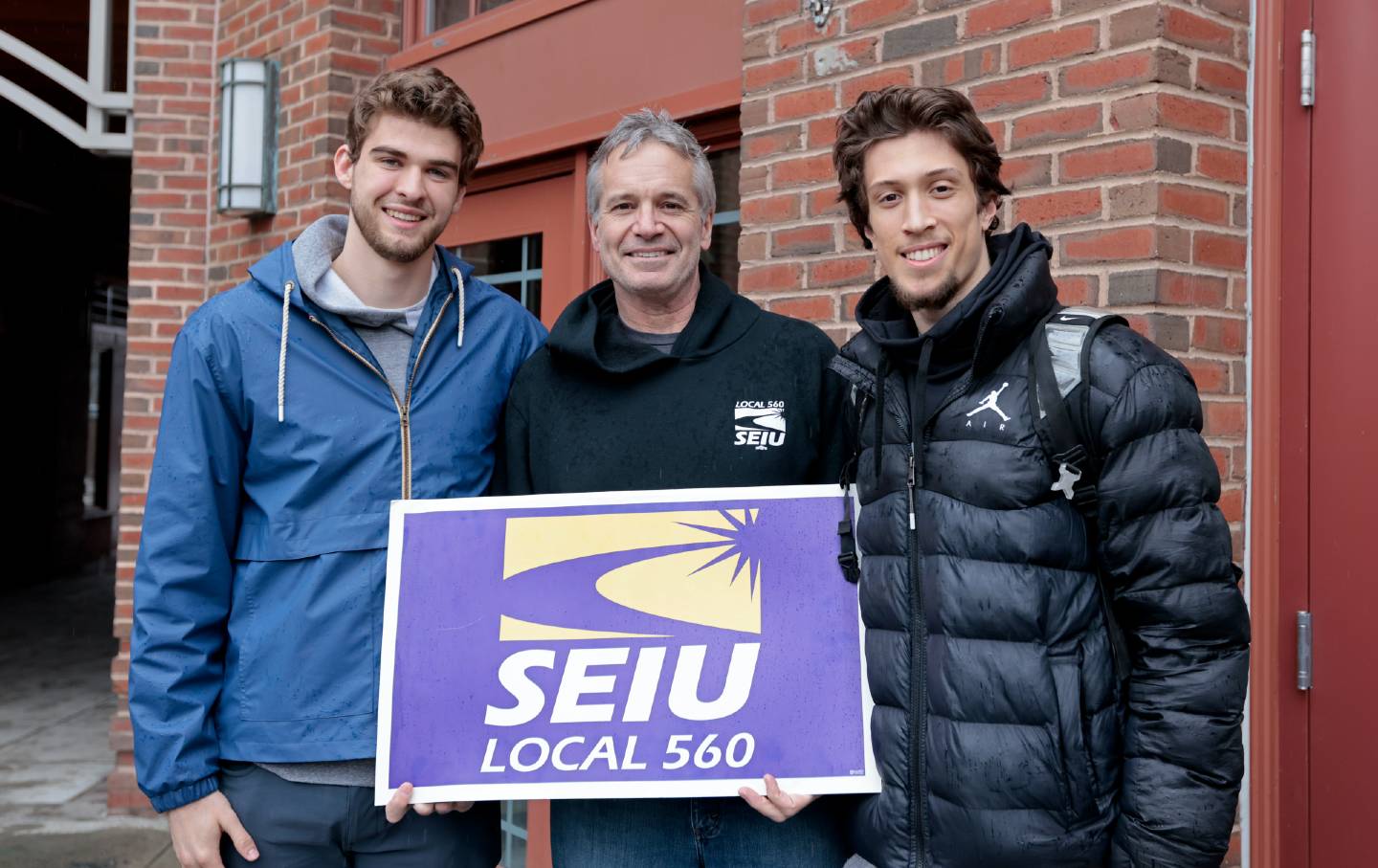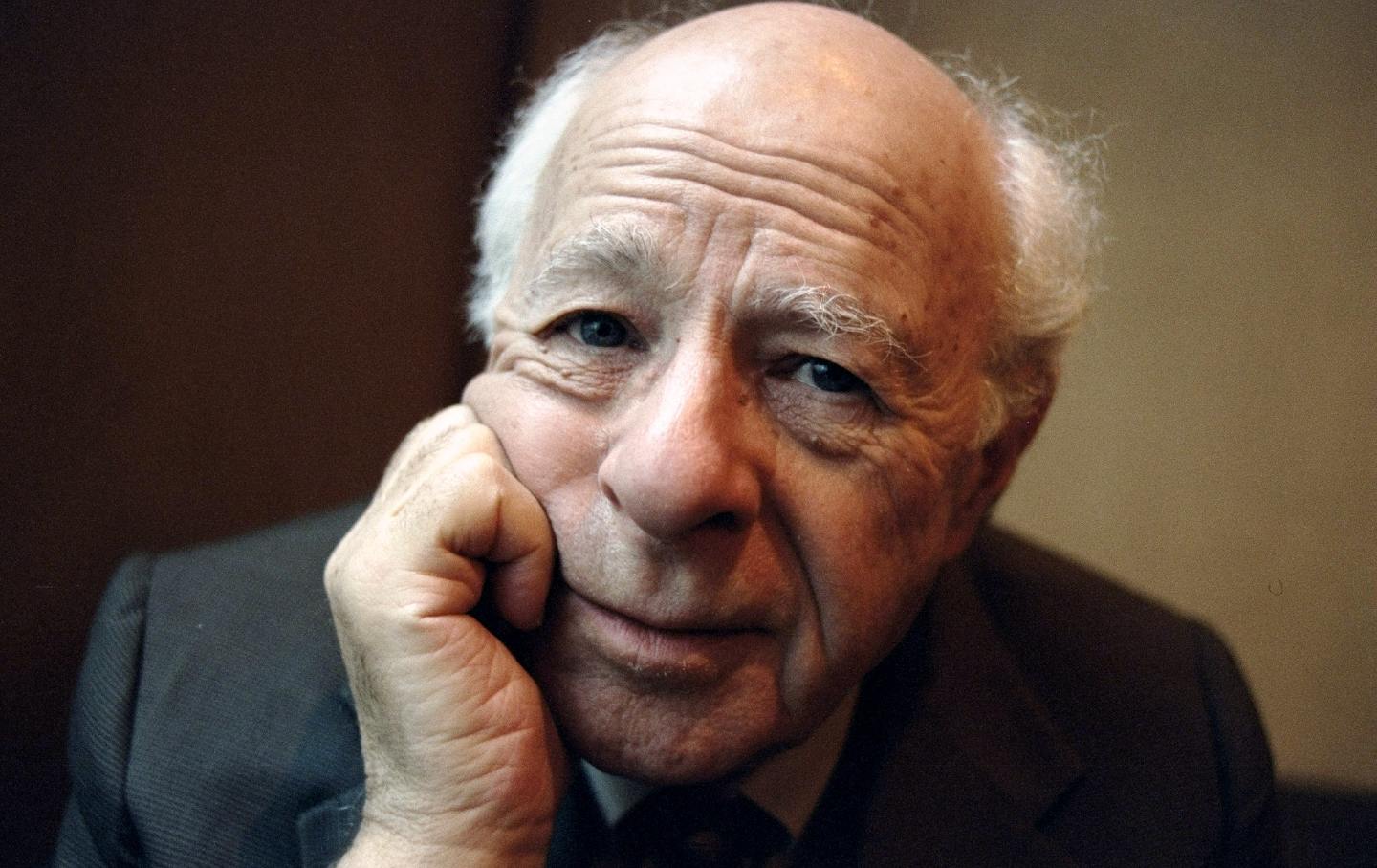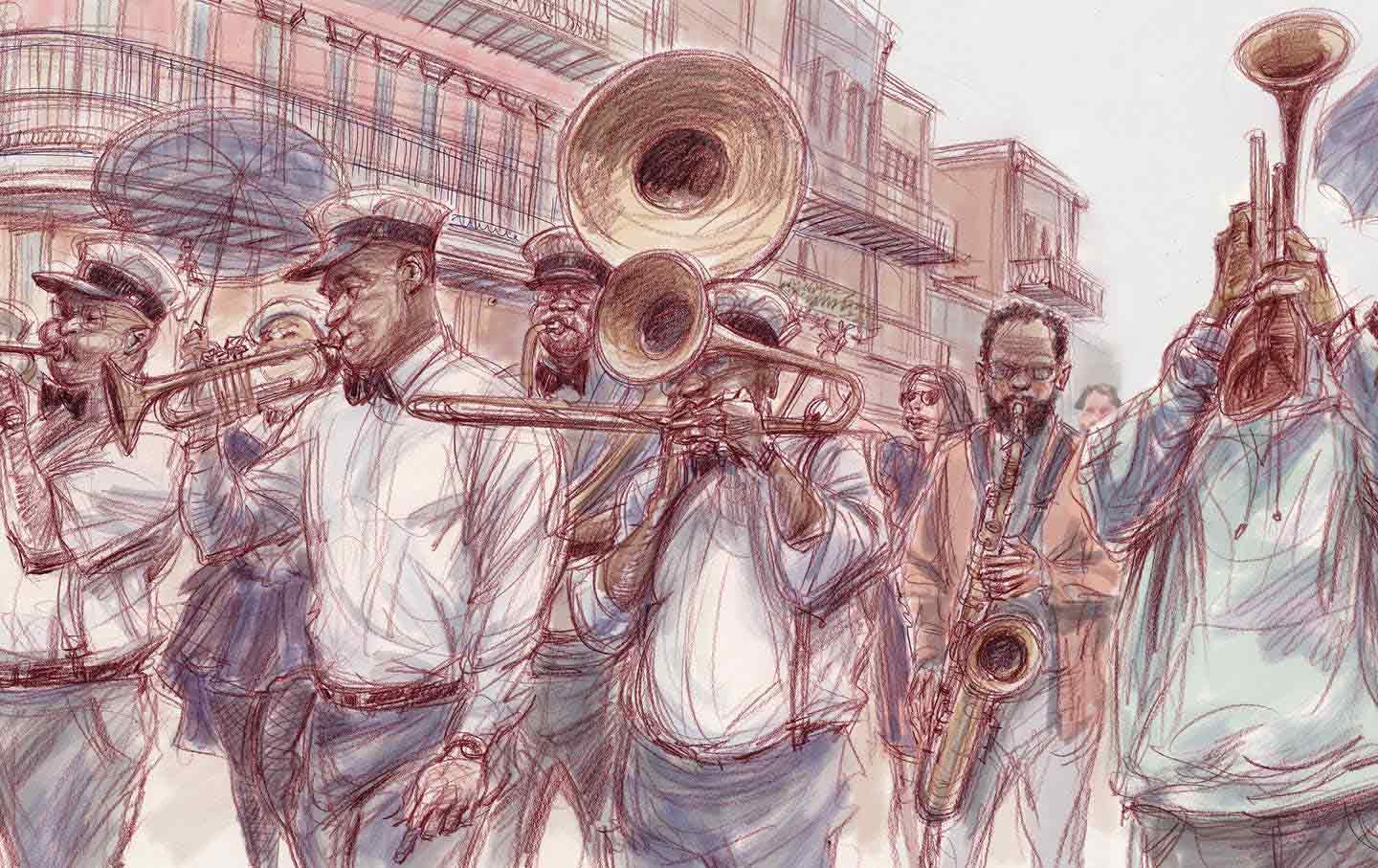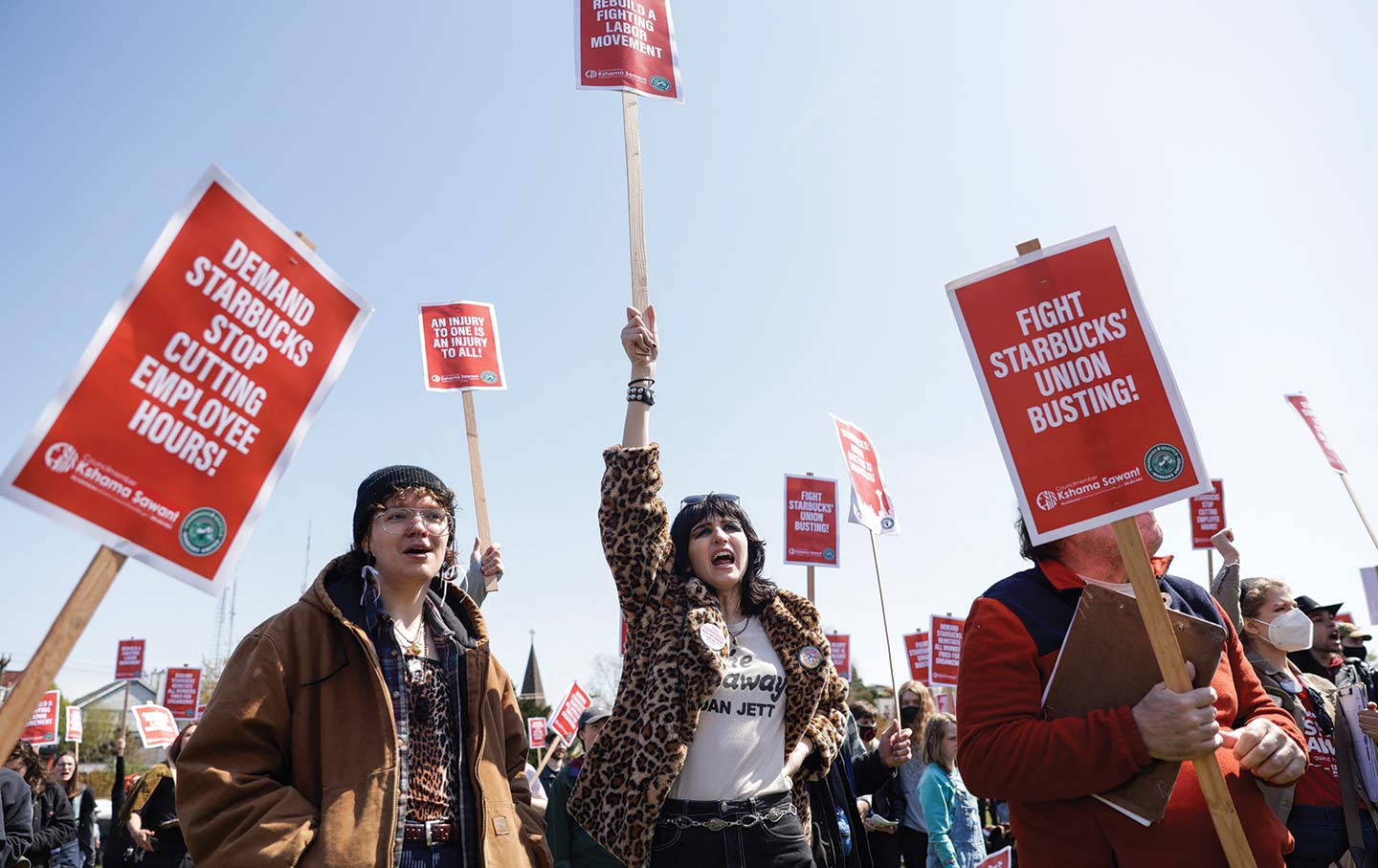The Future of College Sports Is Unionized
The Dartmouth basketball team just voted to join SEIU Local 560, a big step toward ending the exploitation of college athletes.

By voting 13 to 2 to join SEIU Local 560, the basketball team at Dartmouth has put the question of the unionization of college athletes at center court. In the process, the players are educating the NCAA—if it would deign to listen—that the future of university–athlete relations lies in collective bargaining. The current economy of college sports is, to put it mildly, dyspeptic. An unregulated system where players can profit from their name, image, and likeness has upended the revenue-producing sports of football and basketball. The transfer portal that grants the freedom to so-called “student athletes” to switch teams, has also created a cultural sea change. In short, a shifting of power away from autocratic coaches and athletic directors to the players themselves has taken place. Yet there still is that final frontier: unionization and collective bargaining, both of which could build a new and better framework for college sports.
While NIL money benefits a few athletes with regionally or nationally known names—like Iowa basketball star Caitlin Clark or Texas backup quarterback Arch Manning—and the transfer portal has been a vital reform, both skirt the question of whether these “student athletes” are in fact campus workers. As campus workers, they would, in theory anyway, be free to organize into a union and demand collective bargaining over not only compensation but other issues that affect “student athletes” like medical care, travel demands, and the academic freedom to choose classes without athletic department interference. And this is just a smattering of the issues that would surely be brought to the table. Of course, the NCAA and many head coaches have no desire to sit across the table from players. They decry unionization as an affront to everything good and holy about amateur sports, but the fortress of anti-unionism that is the NCAA has been breached by the Dartmouth players. The sooner they recognize that this breach cannot be closed, the better for all parties.
Patrick Hruby, deputy editor of The Washingtonian and a longtime critic of what he calls “sham amateurism,” made the point to me that the NCAA can keep “flushing money” by “paying lawyers and lobbyists who have taken repeated Ls in courtrooms and legislative offices” or they could stop resisting a generation that is not going to take the food scraps for which previous ones—sometimes literally—felt forced to settle. The NCAA can finally see the benefits of collective bargaining, or they can continue in their fierce belief that sham amateurism will have to be pried from their dead hands.
This is a battle for which the players are ready. Teammates Cade Haskins and Romeo Myrthil said to the Associated Press,
“We stuck together all season and won this election. It is self-evident that we, as students, can also be both campus workers and union members. Dartmouth seems to be stuck in the past. It’s time for the age of amateurism to end.”
While many experts cautioned against prematurely celebrating, they made clear that the Dartmouth hoops union is a very big deal. Nathan Kalman-Lamb, co-author of the forthcoming book The End of College Football: On the Human Cost of an All-American Game, said to me, “It is not unreasonable to call the Dartmouth men’s basketball unionization vote the single most significant development to-date in the struggle against the exploitation and harm that define US college sport.”
Similarly, Andy Schwarz, a commentator on the rights of “student athletes,” while lauding the decision, warned me that “this is more a small step than a giant leap.”
One reason for both cheers and caution being the order of the day is that it is not merely the NCAA standing athwart history and saying no to these athletes. Dartmouth College is making its objections clear as well. According to an SEIU spokesperson, the administration told players that unionizing could get them booted from the NCAA or the Ivy League.
In a statement, the Dartmouth administration said, “For Ivy League students who are varsity athletes, academics are of primary importance, and athletic pursuit is part of the educational experience.… Classifying these students as employees simply because they play basketball is as unprecedented as it is inaccurate. We, therefore, do not believe unionization is appropriate.”
This is why Schwarz thinks this is an opening salvo in a bigger fight. He told me, “Until college athletes have the same economic rights as college coaches, whether it’s to negotiate in a free market or to take advantage of the rights and privileges accorded to workers more generally, everyone who is pro-athlete has work to do. With that said, there are lots of hurdles to surmount before it’s real…. Let us hope that Congress doesn’t fall prey to the catastrophizing that this is going to kill college sports.”
Overcoming congressional and NCAA fears about a lawless, unionized future will indeed be a hurdle. But we would do well to remember that the NCAA and their political lobbyists have been braying about progressive reforms killing college sports for at least 50 years. First, it was Title IX—the 1972 law providing women with equal access to, among other venues, athletic teams—that would kill college sports. Then, it was players’ being able to opt out of scholarships after signing letters of intent. More recently, it was NIL and the transfer portal bringing godlessness to the land. Yet, with each reform, the profits grow and the popularity increases, so much so that Caitlin Clark—the NCAA’s biggest star since Tim Tebow—was tempted with a mammoth amount of NIL money to stay at Iowa for a fifth year. Expect more of that and expect the college game to actually be strengthened as a result, with players staying longer and fan interest growing.
While succumbing to collective bargaining would be in the NCAA’s long-term interests, rather than flushing money on lobbyist luncheons and losing lawyers, it’ll fight unionization until the end. This is clearly not about money for the organization. It’s about power. It’s about anti-labor attitudes at the top of the sport—and in Congress. Jason Stahl, the founder and executive director of the College Football Players Association, told me, “This is a momentous day for college athletes across the country. Dartmouth basketball players have shown enormous courage in voting for their union in the face of immense opposition. We hope that college football players across the country see what these young men have accomplished and show the same courage organizing themselves in their own workplaces.”
Meanwhile, while the NCAA splinters, the players at Dartmouth are finding a new kind of community. Caoimhín O’Donnell, the national spokesperson for SEIU, described the following scene: “At the last game…security workers, custodians, people who worked for the library, were cheering really loud, because…we consider [the team] part of local 560 now. In the labor movement, we say siblings—sisters and brothers—those were our brothers playing ball. It was really nice to see these union members excited. There was a real sense of what the team had done and what the local had done and what the members have done.”
Disobey authoritarians, support The Nation
Over the past year you’ve read Nation writers like Elie Mystal, Kaveh Akbar, John Nichols, Joan Walsh, Bryce Covert, Dave Zirin, Jeet Heer, Michael T. Klare, Katha Pollitt, Amy Littlefield, Gregg Gonsalves, and Sasha Abramsky take on the Trump family’s corruption, set the record straight about Robert F. Kennedy Jr.’s catastrophic Make America Healthy Again movement, survey the fallout and human cost of the DOGE wrecking ball, anticipate the Supreme Court’s dangerous antidemocratic rulings, and amplify successful tactics of resistance on the streets and in Congress.
We publish these stories because when members of our communities are being abducted, household debt is climbing, and AI data centers are causing water and electricity shortages, we have a duty as journalists to do all we can to inform the public.
In 2026, our aim is to do more than ever before—but we need your support to make that happen.
Through December 31, a generous donor will match all donations up to $75,000. That means that your contribution will be doubled, dollar for dollar. If we hit the full match, we’ll be starting 2026 with $150,000 to invest in the stories that impact real people’s lives—the kinds of stories that billionaire-owned, corporate-backed outlets aren’t covering.
With your support, our team will publish major stories that the president and his allies won’t want you to read. We’ll cover the emerging military-tech industrial complex and matters of war, peace, and surveillance, as well as the affordability crisis, hunger, housing, healthcare, the environment, attacks on reproductive rights, and much more. At the same time, we’ll imagine alternatives to Trumpian rule and uplift efforts to create a better world, here and now.
While your gift has twice the impact, I’m asking you to support The Nation with a donation today. You’ll empower the journalists, editors, and fact-checkers best equipped to hold this authoritarian administration to account.
I hope you won’t miss this moment—donate to The Nation today.
Onward,
Katrina vanden Heuvel
Editor and publisher, The Nation
More from The Nation

The Longest Journey Is Over The Longest Journey Is Over
With the death of Norman Podhoretz at 95, the transition from New York’s intellectual golden age to the age of grievance and provocation is complete.

The Fight to Keep New Orleans From Becoming “Everywhere Else” The Fight to Keep New Orleans From Becoming “Everywhere Else”
Twenty years after Katrina, the cultural workers who kept New Orleans alive are demanding not to be pushed aside.

Breaking the LAPD’s Choke Hold Breaking the LAPD’s Choke Hold
How the late-20th-century battles over race and policing in Los Angeles foreshadowed the Trump era.

Mayor of LA to America: “Beware!” Mayor of LA to America: “Beware!”
Trump has made Los Angeles a testing ground for military intervention on our streets. Mayor Karen Bass says her city has become an example for how to fight back.

Organized Labor at a Crossroads Organized Labor at a Crossroads
How can unions adapt to a new landscape of work?

The Epstein Survivors Are Demanding Accountability Now The Epstein Survivors Are Demanding Accountability Now
The passage of the Epstein Files Transparency Act is a big step—but its champions are keeping the pressure on.


